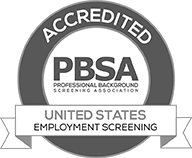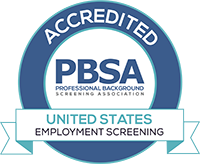BLOG
Is a Second Pre-Adverse Notice Ever Required?
October 25, 2017
A new lawsuit raised this question: if a company denies employment based on two versions of the same background check, should they send two pre-adverse notices?
About the Lawsuit
In the case of Wright vs. Lincoln Prop Co., the plaintiff filed a suit against a potential employer. They had offered him a job that was contingent on the results of his background check. On June 6, the employer saw that an early version of Wright's report included one conviction for driving under the influence and two drug-related felony convictions. This led to them sending a pre-adverse notice and the required accompanying documents, including a copy of Wright's partial background check.
When the employer received the completed report, they decided to deny employment to Wright. They did not, however, send a second pre-adverse notice. When he learned of this, Wright filed a lawsuit against Lincoln Prop Co.
Are Employers Required to Send a Second Notification?
Wright claimed that Lincoln Prop Co. violated the Fair Credit Reporting Act (FCRA) by not sending a second pre-adverse notice after they received the finished version of his report. The FCRA stipulates that job seekers must be notified if an adverse action is being considered.
Applicants must also have the opportunity to see a copy their report and file a dispute if they believe it contains information that is incorrect or not allowed to be shared publicly. Since the employer didn't send a pre-adverse notice for the completed report, Wright did not have an opportunity to view and potentially dispute the final document.
Both the plaintiff and the defendant requested a summary judgment, which would put the blame on the opposite party without the need for a trial. The judge who reviewed this case determined that it must be heard by a jury.
Next Steps
Before calling for a trial by jury, the judge noted that there were no material differences between the two iterations of Wright's report. According to the judge, the final document simply provided a more comprehensive summary. Therefore, it was concluded, the plaintiff did not have an opportunity to view the finished report and the case could not be dismissed.
A jury must be assembled before the case can proceed. Only then will it be determined whether or not the employer will be held responsible for not sending a second pre-adverse notice with the accompanying documents.
Compliance
Remaining compliant with all the federal, state and county laws that cover background screening can be difficult. There are numerous laws beyond the FCRA that list steps employers must adhere to when running background checks for hiring, promoting or other screening purposes.
Backgrounds Online strives to keep up with relevant laws that impact our customers. While this case presents a scenario that has not occurred before, the outcome may have an impact on the pre-adverse notification process that all employers must follow. We'll keep up with this story and provide updates as the case progresses.
The team at Backgrounds Online is committed to helping our clients become and remain compliant with relevant laws. We are accredited by the National Association of Professional Background Screeners and everyone on our team earns their FCRA certification. To learn more about how we can help you with your screening and compliance efforts, please contact us.







